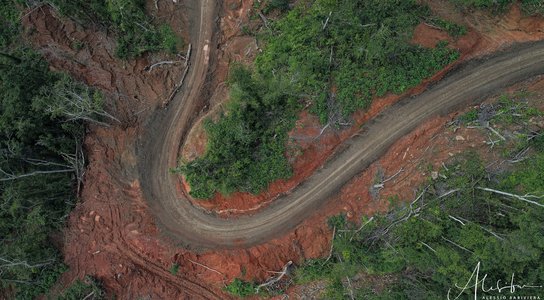Pictures of devastating forest fires and cleared rainforests are becoming all too familiar as forests critical for the global climate are being destroyed at an alarming pace. According to the latest data, we lost a football pitch of primary rainforest every 6 seconds in 2019.
Consumer countries like the UK have a key role to play in tackling global deforestation. The land used to produce UK imports of commodities associated with deforestation – like beef, leather, soy, palm oil and timber – has been shown by WWF and RSPB to take up an area almost the size of the UK itself.
So it is welcome news that the UK government has launched a consultation on a proposed new law to tackle the country’s imported deforestation footprint. The current proposals would make it illegal for large business to use, either in production or trade within the UK, forest risk commodities (including those embedded within products) that have not been produced in accordance with relevant laws in the country where they are grown. Businesses would be required to conduct due diligence and report on this exercise publicly, with potential fines and sanctions for non-compliance.
This follows the recommendations published earlier this year by the UK government’s taskforce on the country’s global deforestation footprint (the Global Resource Initiative) which urged the UK to ‘urgently’ adopt mandatory due diligence legislation to require businesses, including finance, to check that their supply chains and finance are deforestation free. This echoed similar calls by organisations like Global Witness, as well as a growing number of companies.
However, if the government is to realise its ambition of creating ‘world-leading’ environmental legislation ahead of hosting the COP26 climate talks in Glasgow next year, it will need to use this consultation to develop the proposed legislation beyond what is currently on the table.
Deforestation drives the climate crisis – whether it’s legal or illegal
A fundamental problem with the UK government’s proposal is that it only focuses on illegal deforestation, relying on a small number of forest related laws in producer countries, without reference to broader laws, including indigenous land tenure.
As the UK government acknowledges in its own consultation document, only half of all recent tropical deforestation is the result of illegal clearance for commercial agriculture and timber plantations. Tolerating UK involvement in legal deforestation could encourage efforts to roll-back hard-won laws and forest enforcement systems, such as Jair Bolsonaro is currently doing in Brazil. The scope of the UK proposal must therefore be broadened out to apply to all deforestation if the legislation is to be effective at protecting our climate and environment.
This narrow focus on illegal deforestation is also lagging behind the approach taken by industry for the last decade - industry standards, company policies and global initiatives such as the New York Declaration on Forests all address deforestation as a whole rather than focusing only on illegal deforestation.
Setting a clear, deforestation-free standard is easier for everyone to apply
The focus on ‘illegal’ deforestation will not only limit the effectiveness of the law but could also pose a challenge for businesses, who may struggle to navigate a plethora of national and local laws and ongoing court hearings to establish whether deforestation is illegal in each specific case. The UK government has the opportunity to provide much-needed clarity to businesses by setting a clear deforestation-free standard to apply to all forest-risk industries in all countries.
A strong and uniform compliance standard on deforestation would ensure companies are screening out deforestation from their supply chains. The law should apply to all businesses to ensure that no-one is exempt from acting on deforestation. Once the law is passed, guidance could be provided to regulators to focus their enforcement on businesses with the highest-risk and highest-exposure to deforestation.
UK law has already defined its own standard on issues like bribery, corruption and wildlife trafficking. This ensures that UK businesses are not supporting these harmful practices - irrespective of what local rules may allow. For deforestation, this standard-setting could draw on existing measures and benchmarks such as those articulated under the internationally-recognised voluntary Accountability Framework Initiative and the UK government could also consider the establishment of a science-based panel to advise on the development of standards specific to different agricultural commodities.
Do not hinder those leading the fight to keep forests standing
Forest destruction – whether legal or illegal – often relies on ignoring or intimidating the indigenous peoples and forest communities who raise the alarm. Local communities and defenders are on the frontline of fighting to protect the forests they have safeguarded for generations and they are often silenced by threats, violence, or even murder when they speak up against forest destruction and illegality, as Global Witness has repeatedly shown.
The UN, leading scientists, industry standards, company policies and affected communities themselves have all reiterated the importance of requiring Free, Prior and Informed Consent (FPIC) from indigenous peoples and local communities to overcome these issues. If indigenous peoples and forest communities are aware of, and consent to activities happening in their area and have a meaningful say in how they proceed, the likelihood of deforestation, corruption, violence and abuse is much lower.
The UK government should build FPIC into the legislation, drawing on precedents in national and international law, industry guidance and standards, and cases filed under the Roundtable on Sustainable Palm Oil, the OECD Guidelines on Multinational Enterprises and the World Bank accountability mechanism.
Don’t let finance off the hook
As highlighted by the UK-governments own Global Resource Initiative (GRI) taskforce, it’s important that any mandatory due diligence measures on deforestation covers finance. The taskforce came to this conclusion after lengthy discussions on current practices in the sector, what is most likely to effect change and a stocktake of current finance and climate initiatives.
The finance industry provides a lifeline to companies involved in deforestation, and UK-based financial institutions are some of the worst offenders. As we reported last year, UK-based financial institutions have been the single biggest source of international finance for six of the most harmful agribusiness companies involved in deforestation in the climate-critical forests of Brazil, the Congo Basin and Papua New Guinea, providing a staggering £5 billion over the last six years.
Requiring mandatory due diligence by UK finance on deforestation risk is crucial to provide a consistent standard for all UK companies. Otherwise, there’s a risk that companies will be hearing one set of priorities from government, while the financiers that determine their company’s share price and loan repayments will fail to take forest destruction into account.
An important opportunity to end the UK’s complicity in global deforestation
While we think that more needs to be done if the proposed law is to fulfil the government’s ambition, it is important that UK government recognises that it needs to get its own house in order if it is to be seen as a leader on tackling climate change. If the UK government turn up to host COP26 having passed a strong law that stops the complicity of UK business and finance in global deforestation, others will likely follow.
This page was updated on 22 September 2020.


